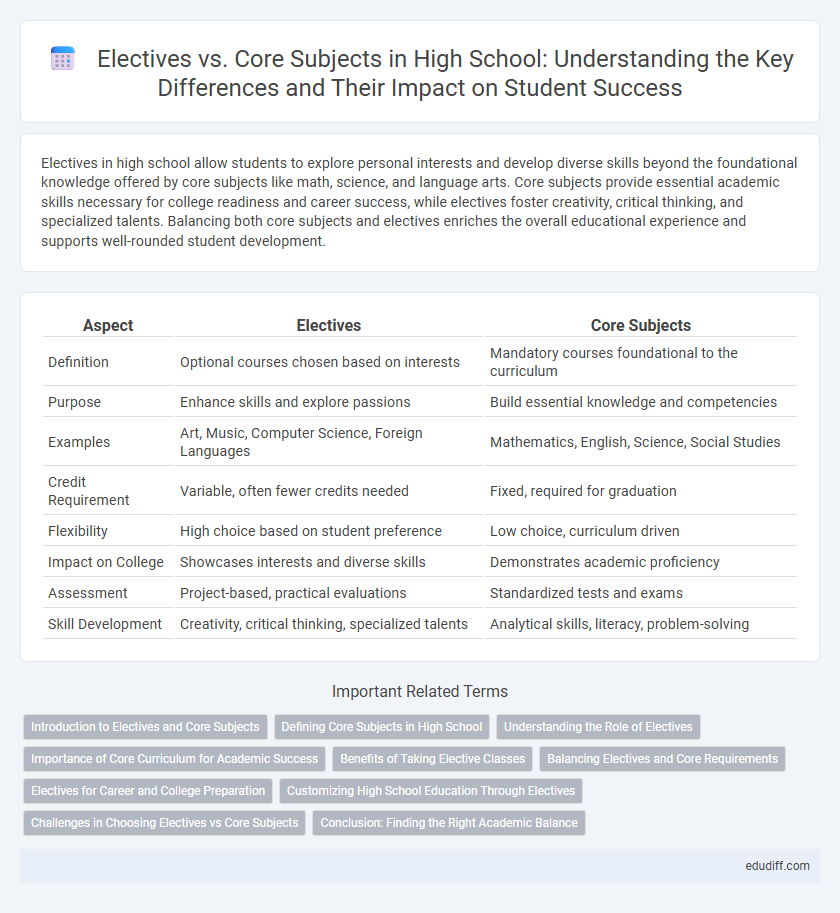Electives in high school allow students to explore personal interests and develop diverse skills beyond the foundational knowledge offered by core subjects like math, science, and language arts. Core subjects provide essential academic skills necessary for college readiness and career success, while electives foster creativity, critical thinking, and specialized talents. Balancing both core subjects and electives enriches the overall educational experience and supports well-rounded student development.
Table of Comparison
| Aspect | Electives | Core Subjects |
|---|---|---|
| Definition | Optional courses chosen based on interests | Mandatory courses foundational to the curriculum |
| Purpose | Enhance skills and explore passions | Build essential knowledge and competencies |
| Examples | Art, Music, Computer Science, Foreign Languages | Mathematics, English, Science, Social Studies |
| Credit Requirement | Variable, often fewer credits needed | Fixed, required for graduation |
| Flexibility | High choice based on student preference | Low choice, curriculum driven |
| Impact on College | Showcases interests and diverse skills | Demonstrates academic proficiency |
| Assessment | Project-based, practical evaluations | Standardized tests and exams |
| Skill Development | Creativity, critical thinking, specialized talents | Analytical skills, literacy, problem-solving |
Introduction to Electives and Core Subjects
Core subjects in high school, such as math, science, English, and social studies, provide foundational knowledge essential for graduation and college preparation. Electives offer students opportunities to explore interests beyond core academics, including courses in art, music, technology, and foreign languages. This balance between core subjects and electives supports both academic achievement and personal development during high school.
Defining Core Subjects in High School
Core subjects in high school are foundational courses required for graduation, including English, mathematics, science, and social studies. These subjects develop essential skills such as critical thinking, literacy, and quantitative reasoning necessary for college and career readiness. Mastery of core subjects is crucial for standardized testing performance and meeting state educational standards.
Understanding the Role of Electives
Electives play a crucial role in high school education by allowing students to explore their interests and develop specialized skills beyond core subjects like math, science, and language arts. These courses foster creativity, critical thinking, and real-world application, enriching the overall learning experience. Understanding the balance between core subjects and electives helps students make informed decisions that align with their future academic and career goals.
Importance of Core Curriculum for Academic Success
Core curriculum subjects such as mathematics, science, language arts, and social studies establish the foundational knowledge and critical thinking skills essential for academic success and college readiness. Mastery of these core subjects correlates strongly with higher standardized test scores, improved problem-solving abilities, and better overall performance in advanced coursework. Electives provide opportunities for personal growth and specialized interests but should complement rather than replace the rigorous engagement with core academic disciplines.
Benefits of Taking Elective Classes
Elective classes in high school provide students with the opportunity to explore personal interests, develop specialized skills, and enhance creativity beyond the mandatory curriculum. These courses often improve critical thinking and problem-solving abilities by offering diverse perspectives and hands-on experiences. Exposure to electives can boost college applications and career readiness by aligning academic skills with future goals and workplace demands.
Balancing Electives and Core Requirements
Balancing electives and core requirements in high school ensures students develop essential skills while exploring personal interests, enhancing academic engagement. Prioritizing core subjects like math, science, and language arts provides a strong foundation for college readiness, while strategically selecting electives in arts, technology, or social sciences promotes well-rounded knowledge. Effective schedule planning helps maintain academic performance without overloading, supporting both graduation requirements and individual growth.
Electives for Career and College Preparation
Electives in high school offer students the opportunity to explore specialized subjects like computer science, graphic design, and foreign languages that align with their career interests and college goals. These courses develop practical skills and enhance college applications by demonstrating initiative and diverse talents beyond core subjects such as math, science, and English. Choosing relevant electives helps students build a focused academic portfolio, increasing competitiveness in college admissions and future job markets.
Customizing High School Education Through Electives
Electives allow high school students to tailor their education by exploring subjects beyond core requirements such as math, science, and language arts, fostering personal interests and strengths. These courses, ranging from art and technology to foreign languages and vocational training, enhance engagement and provide practical skills relevant to future careers. Incorporating electives creates a more dynamic curriculum that supports both academic growth and individual development.
Challenges in Choosing Electives vs Core Subjects
Students face challenges in balancing academic requirements with personal interests when choosing electives versus core subjects. Core subjects like math, science, and language arts provide essential foundational knowledge but may lack appeal or flexibility. Electives offer opportunities for exploration and skill development; however, selecting the right electives requires careful consideration of future goals and workload management.
Conclusion: Finding the Right Academic Balance
Striking the right academic balance between electives and core subjects is essential for high school students to develop both foundational knowledge and personal interests. Core subjects such as math, science, and language arts build critical skills necessary for college readiness and career success, while electives like art, music, and computer science foster creativity and specialized talents. Combining rigorous core courses with diverse electives enables a well-rounded education that supports academic growth and engagement.
Electives vs Core Subjects Infographic

 edudiff.com
edudiff.com